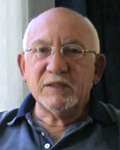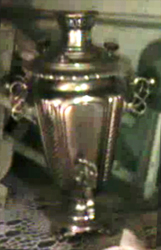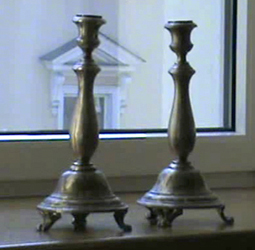A Story for My Children
by Benzion Usant, son of Abram Yuzent
Recorded after a visit to Trashkun in 2007
Translated from Hebrew by Misha Glezer & Sonia Kovitz
✷ See also: Yuzent family

Benzion Usant (2007)
These are our family members who were killed by the fascists—in Trashkun or the Pajuoste forest in 1941 unless noted otherwise:
- My grandparents Berl Yuzent and his wife Chaya
- My father’s brother Moshe Yuzent, his wife Golda and three of their four children, in Šeduva (Shadeve)[NOTE]Meyer Juzint was the only surviving child of Moshe and Golda. He later went to America.
- My father's sister Musya, her husband Moshe Milner and their two daughters, in Biržai (Birzh)
- My father's brother Itzhak, his wife Chana and two daughters
- My father’s brother Nosn (Nissan) Yuzent, his wife Dvora (née Glezer), and five of their six children.[NOTE]Zelda Yuzent (married name Kotkis) was the only surviving child of Nosn and Dvora. See Kotkis memoir on this website for an account of her escape to the east.
Their eldest daughter Sarah and her husband Itzik Luria were killed in Kaunas (Kovno) at the Ninth Fort.
My grandfather Berl Yuzent came from a very large family. He had eight brothers and sisters. I visited the Vilna Gaon Jewish State Museum in Vilnius, where I found a record that Leyb Yuzent, whom I knew nothing about, had fought with the partisans and perished on 10 October 1944. In the museum archives I also found a book of records on Trashkun that contained more information about my grandfather’s family, but I didn’t have enough time or emotional strength to examine it further.
I arrived in Trashkun without any detailed information, and I can simply say that God helped me at the moment when I met a Lithuanian man named Algimantas Klimavicius. He happened to come from Vilnius on that day to visit his son in Trashkun. It was a miracle that Algimantas saw the crowd of people gathered around me in the center of town. He approached us when he heard that I was interested in whether anyone knew of the Yuzent family.
He immediately said, “Berl Yuzent, yes, I knew him well!” Algimantas explained that he was once a neighbor of my grandfather and knew a lot about our family. Echoing what a woman in Šeduva had told me earlier, Algimantas stated that the past isn’t worth talking about because talking about it won’t change anything. But then he added that he knew how our family was killed, that the Jews were taken to Pajuoste, what happened there, and that the Jews never came back.

The document that Algimantas showed Benzion
Then he told me to wait a minute. Five minutes later he returned with some papers and a document from the Bureau of Land Registry that listed the names of the people who lived in the Yuzent family’s house. The document included a drawing showing the location of the parcels of land beside the house, and it stated that Berl Yuzent had bought the land and the house in 1935.
I was not sure that I had understood everything that Algimantas had said about the document and the purchase. The translator and the guide explained that my understanding was not quite correct, and that the house of my grandfather Berl Yuzent now belonged to Algimantas.
Later I learned that there are various stories about this document. Several people told me that the date on the document was forged, and that my grandfather actually signed it a short time before he was killed near the Old Jewish Cemetery. He was promised that if he signed the document, he and his family would be safe.
Algimantas invited me to the house, where people are living now. We saw the inside and outside of the house, and Algimantas talked about what happened there in those times. He told me how all the Jewish people who lived near my grandfather’s house were killed, but he did not say a word about how my own family was killed. Although he was very young during the war, he was probably aware of what the older people, including his own father, did to the Jews in Trashkun. One has to wonder why he hid this information from me.

Samovar in the storeroom
Since Algimantas seemed to be a decent person, I asked him this question: “Can you please tell me one simple thing? People left these houses, they didn’t take anything with them, and nothing was burned. What happened to all the things that were in the houses? Is it possible that something might still remain?”
Algimantas nodded his head and suggested that we go together to the storeroom to see what was there. When I went inside, I saw a shelf of books and hoped to find some Jewish prayer books, but discovered that there were only books in Latin characters.
When I turned around, I saw the old samovar that my father had told us about. His family had brought it from Russia when they returned to Trashkun after World War I. At that moment I noticed two candlesticks and remembered my father telling me about the traditional workmanship in Jewish sacred objects. He had also told me that instead of putting flowers on graves, Jews put little stones on them, and that all sacred Jewish objects should be smooth—just like these very candlesticks that I was looking at.

The Yuzent family's candlesticks that
Benzion managed to retrieve from Trashkun
I remembered that when my father had lit candles at home, he had said tearfully that the candlesticks which he himself had bought were similar to the candlesticks that had belonged to his parents (my grandparents Berl and Chaya). Now I was looking at those very candlesticks in the storeroom. So I said to Algimantas, “These candlesticks hold great significance for me. Please tell me how much they cost and I will buy them from you.” He answered that I should name a price.
I noticed that Algimantas’ wife shook her head and did not want to sell the candlesticks. His daughter-in-law also was opposed to selling them. I decided to make a special effort to convince him that I should have the candlesticks, and I did it in a very simple way. I told him, “The candlesticks are religious Jewish ritual objects that hold no special meaning for you, and if you keep them here, they might even harm you. If I can have these candlesticks, I will send you a statue of Jesus on the cross, carved from olive wood, which I will buy in a holy place connected with Christianity—Nazareth or Bethlehem.”
When Algimantas told his wife about the statue of Jesus and said something else that I couldn’t understand, I knew that everything would turn out well. He gave me the candlesticks without asking me to pay for them. When I went back to Israel, I sent him exactly what I had promised.
After all this happened, I felt that it had been God’s plan for me. I thank God that I have many grandchildren, and if one day someone in our family wants to learn the history of the Jewish catastrophe in Lithuania, one of the grandchildren might earn a master’s degree or even a doctorate based on this material. I believe that my visit is a fulfillment of the last wishes of my parents, Abram and Hadassa Yuzent. I am very glad I made the effort to visit Trashkun, and I ask you, my grandchildren, to remember this story and to follow our family tradition.

